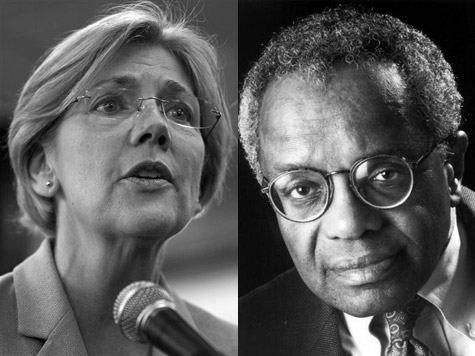
A newly discovered editorial by Derrick Bell and a response by HarvardLaw School sheds light on the current controversy over Elizabeth Warren’sself-identification as a “Native American.” Pushback on the story hasfocused on the fact that Warren did not need minority status to be hired atthe prestigious law school. But the real beneficiary of Warren’s minorityclaims wasn’t Warren herself; it was Harvard Law.
In 1969, Derrick Bell became the first black law professor at Harvard. Hewas given tenure in 1971 and over time felt that not enough minoritiesprofessors were given a place at the school. By 1986, he was leading studentprotests at Harvard for their failure to grant tenure to two black lawprofessors who were teaching his critical race theory.
The pressure to hire more minority law professors continued over the nextseveral years. This 1988 report in the NY Timesannounces the conclusion of a 24-hour sit-in of the office of JamesVorenberg, then Dean of Harvard Law. Minority students at the law school staged the protest to demand that Harvard hire “20 women or members ofminority groups in the next four years as tenured or tenure-trackprofessors.” Barack Obama would enter Harvard Law just a few monthslater.
In 1989, Derrick Bell took his protest to a new level. At the time therewere five black men who were tenured professors at Harvard but no blackwomen, no minority women at all in fact. Bell decided to go on an unpaidleave of absence until this situation was rectified. One year later, in1990, Bell was celebrated on campus by a group ofstudents led by a young Barack Obama. When Bell requested an extension ofhis leave of absence, his tenure ended and he effectively left Harvard forgood.
In 1995, with this controversy still swirling around the school, Harvardhired its first minority woman law professor, Elizabeth Warren. In fact, the position was offered to her in 1993, according to the Harvard Crimson, and she accepted two years later. The 1993 article covering the story states, “The vote marks an advance in the student and faculty effort to improve faculty diversity.”
Warren hadidentified herself as Native American in legal directories since 1986. Herclaim to minority status (1/32nd Cherokee, and even that is questionable)was later touted by the law school’s spokesman in a1996 Crimson article. He wrote, “Of 71 current Law School professorsand assistant professors, 11 are women, five are black, one is NativeAmerican and one is Hispanic.”
In 1998, Harvard Law hired Lani Guinier, the first black womanprofessor at the school. Despite having left Harvard years earlier,Derrick Bell considered this a victory. He wrote an op-ed in the January 29edition of the NY Times which, for some reason, is not available on the web.It was, however, possible to track down a copy at the local library.

Bell opens his op-ed: “There has been a breakthrough at Harvard Law School.It has hired Lani Guinier as its first tenured black female professor. Whattook Harvard so long?” In response to the broadside, Harvard’s News Director(the same individual quoted by the Crimson two years earlier) sent a letterto the editor which was published by the Times on February 1, 1998.
Re the Jan. 29 Op-Ed article on hiring at Harvard Law School:Since 1989 the school has appointed to the faculty or voted tenure for fourAfrican-Americans, a Hispanic professor and eight women, including aNative American.
The Crimson also published a story welcoming Lani Guinier to thefaculty, once again touting Elizabeth Warren’s minority status:
Guinier will become the first female African-Americanprofessor in the 181-year history of HLS. A former Clinton nominee andformer NAACP lawyer and an expert on voting rights and civil-rights law,Guinier is a welcome addition to the HLS faculty. However, her appointmentis the first in what continues to be a painfully slow process of bringingprofessors of minority ethnicities to the Harvard University faculty.
Harvard Law School currently has only one tenured minority woman,Gottlieb Professor of Law Elizabeth Warren, who is Native American. Theracial makeup of the HLS Faculty has been an issue before as well: in 1989,Harvard dismissed Weld Professor of Law Derrick A. Bell after 18 years ofteaching because the noted expert on race and law refused to end his leavein protest of the absence of minority women on HLS faculty. [emphasis added]
After the story about Warren’s minority status broke last month, the NYTimes published a pushback piece whichclaimed Warren’s race had nothing to do with her being hired by variouslaw schools. It quotes a chairman of the University of Texas law schoolsaying, “To suggest that she needed some special advantage to be hired hereor anywhere is just silly.”
What’s truly silly is the way the NY Times ignores the obvious context ofWarren’s hiring. Being “Native American” may or may not have benefitedElizabeth Warren, but there’s no doubt that it benefited Harvard Law School.Harvard had been under fire for decades by Derrick Bell and others who feltthe school lacked sufficient commitment to diversity in hiring. In thisongoing conflict, Warren’s minority status was used as a shield againstcriticism on at least two occasions: once in the Crimson in 1996 and oncemore in the Times in 1998. Given Harvard Law’s history of protests, sit-ins,and high profile departures over diversity hiring, it’s difficult to believeWarren’s minority status, repeatedly touted by school officials after shewas hired, wasn’t noticed during her hiring.

COMMENTS
Please let us know if you're having issues with commenting.